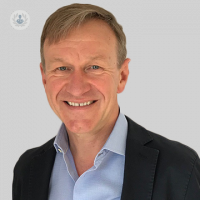Adult ADHD (Part 2): Symptoms and Treatment
Written by:ADHD (attention deficit hyperactivity disorder) is a behavioural disorder characterised by a pattern of symptoms that affect daily function. Although symptoms of ADHD are usually recognised early, some people may not get an ADHD diagnosis until adulthood.
Following on from the first part on ADHD diagnosis, renowned consultant psychiatrist, Dr Richard Bowskill, offers an expert insight into the symptoms and treatment of ADHD in this conclusion of a two-part series of articles on adult ADHD.

What are some signs of ADHD in adults? Which factors can trigger these symptoms?
Frequently, people who have ADHD report that their mind is very busy, describing it as being full of thoughts. People who have ADHD do not think sequentially, and thus, have lots of jumbled thoughts which can be like having lots of channels opened at the same time or like having thoughts that are like spaghetti, in a jumbled mess or as being foggy. People who have ADHD will also say that it is very difficult to sustain and focus on concentration.
Sometimes, people who have ADHD will report procrastination, where they will go over and over tasks without actually managing to start them. Thus, people who have ADHD will typically make many different types of lists to try to improve their focus and concentration, but then struggle to know how to initiate these tasks.
Often, there is also a lot of executive dysfunction involved, and people who have ADHD will usually be very disorganised and end up missing appointments, or lose things very frequently both at school/university and at work. This can be very frustrating.
Another aspect of ADHD is that people who have ADHD commonly find it very hard to follow instructions, because they will lose track of the conversation halfway through. People who have ADHD will frequently get lost and find it hard to navigate themselves around maps, situations, and even in conversations, where they will sometimes lose themselves because they get distracted by other things that are going on.
When hyperactivity and impulsivity kicks in, people who have ADHD will sometimes second-guess conversations, and they will blurt things out or butt into conversations and finish them before the other person is actually ready to finish talking.
Furthermore, mood instability (mood fluctuations) is also a common aspect of ADHD. This is not a core diagnostic feature, but it is a common associated problem. People who have ADHD will often describe rapid changes in their mood, and sometimes may be misdiagnosed with having bipolar disorder.
When should you see a specialist? How can a psychiatrist help?
If ADHD is impacting on functioning either in education or work, or if ADHD is affecting self-esteem and the way a person feels about themselves, then seeing a specialist can help to diagnose the condition and help to manage these issues.
There are several psychological techniques that can be used for ADHD, and there is a lot of coaching and lifestyle advice that can be useful, as well. Other people who have ADHD can also give tips and advice on how to manage executive functioning.
Medication is and can also be important. Dopamine and noradrenaline are underactive in the brains of people who have ADHD, and thus if these are raised, then this will help with focus, concentration, relaxation, and initialising and completing tasks.
For this reason, all the medications that are helpful for ADHD actually boost noradrenaline and dopamine in different ways. One of these medications is a re-uptake inhibitor, called atomoxetine, that works like an antidepressant. The other group of medications are called psychostimulants, such as methylphenidate and lisdexamfetamine, that increase noradrenaline and dopamine, and help with focus and concentration.
Despite the psychostimulants, people who have ADHD will sometimes sleep better with medication, because they are able to switch off their racing thoughts more easily, feeling calmer and less agitated. Obviously, there are risks and benefits to work through, as well as side effects to watch out for with medication, and a specialist will discuss these and carry out regular monitoring to check that everything is alright. In addition, pulse and blood pressure will also need to be checked to make sure that they are not raised by the medication.
Medications also have different side effect profiles, and thus, if people develop side effects to one medication, then the medication can be switched with another one. In some cases, medications can be combined with other types of antidepressants as well, which can raise noradrenaline and help with symptoms.
Dr Richard Bowskill is a renowned consultant psychiatrist with over 30 years’ experience who specialises in the assessment and treatment of ADHD, and other mental health conditions such as depression.
If you have been living with symptoms of ADHD, do not hesitate to reach out to Dr Bowskill to receive expert assessment and treatment.


